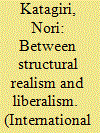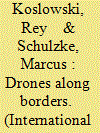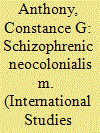|
|
|
Sort Order |
|
|
|
Items / Page
|
|
|
|
|
|
|
| Srl | Item |
| 1 |
ID:
162653


|
|
|
|
|
| Summary/Abstract |
In this article, I argue that Japan's threat perception has evolved in response to the balance of power and perceived intent. Russia, North Korea, and China are all nuclear powers with sizable conventional forces, but the level of threat varies over time, with Japan's response pattern changing from Russia to North Korea to China in recent years. Japan remains a quiet member of the war on terror, but it faces little direct threat from global terrorism and groups like al Qaeda and the Islamic State. Japan's threat response is unique; it skews toward weapons acquisition and enhanced logistics, limiting to a minimum constitutional reform and changes in national security institutions. The well-known antimilitarist norm of the postwar era may be eroding, but it still puts a heavy brake on many “revisionist” projects, including constitutional amendment of Article 9. As a result, Japan's response to the threats has been modest, doing little to prevent China's rise, while growing more dependent on the United States.
|
|
|
|
|
|
|
|
|
|
|
|
|
|
|
|
| 2 |
ID:
162652


|
|
|
|
|
| Summary/Abstract |
This article examines the complex security landscape that is unfolding as states deploy military drones for border security and non-state actors with sharply diverging motives develop their own drone surveillance capacities. We argue that border security drones have contrary political, policy, and ethical implications. First, the encroachment of military technologies into non-military security operations may have adverse security repercussions, but drones may also save migrants’ lives as they make dangerous journeys through deserts and across rough seas. Second, drone surveillance erodes privacy but also creates new accountability mechanisms. Finally, drones may obviate some visible signs of security, such as fences, while also introducing an invisible security apparatus that extends beyond state boundaries. These contradictory effects help to explain the complex policy formation processes underlying drone border security programs in the United States and Europe, as well as the challenge of reaching clear answers about whether drone security is desirable.
|
|
|
|
|
|
|
|
|
|
|
|
|
|
|
|
| 3 |
ID:
162654


|
|
|
|
|
| Summary/Abstract |
The Sahel region is home to several groups that profess to be jihadi in orientation. To raise funds, these groups rely on criminal activity that nets them millions of dollars, and helps them embed within local communities. As worrying as the presence of these entities is, what is of greater concern is the way the United States and France have militarized the region. The argument made in this article is twofold. First, the appeal of the Sahel jihadi-criminal groups is based in pervasive human insecurity and not theological affinity with radical Islam. Second, the counterterrorism and counterinsurgency policies promoted by the United States and France militarize the region and are likely to cause more instability. It is imperative to rethink interventionist policy in the region.
|
|
|
|
|
|
|
|
|
|
|
|
|
|
|
|
| 4 |
ID:
162651


|
|
|
|
|
| Summary/Abstract |
US foreign policy on AIDS assistance in Africa has gone through many shifts in resource investment and focus, reflecting the politics of the culture war in the United States. Because AIDS cannot be addressed without consideration of sexuality, these shifts have resulted in very different sets of recommendations in African countries on sexual behavior and values. Because they are dependent on the United States for material and technological resources, African countries have been incorporated into this cultural debate as a form of sexual and cultural neocolonialism.
|
|
|
|
|
|
|
|
|
|
|
|
|
|
|
|
|
|
|
|
|